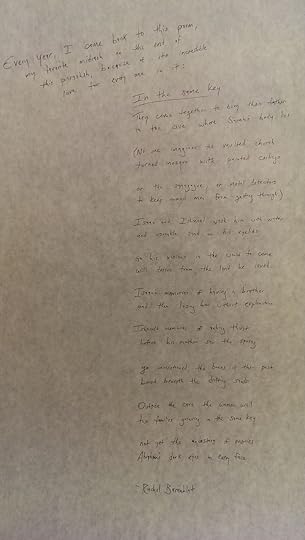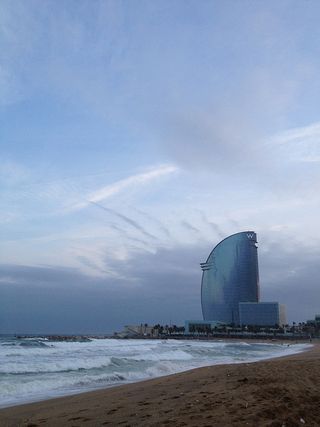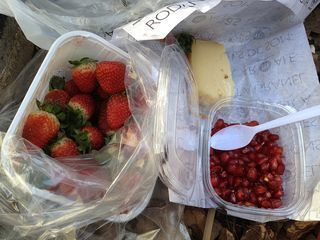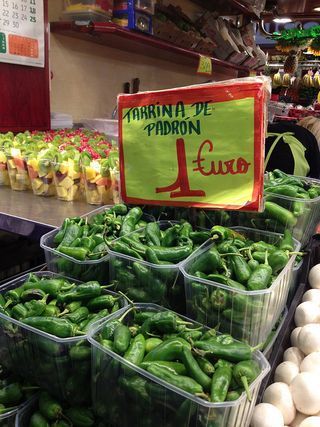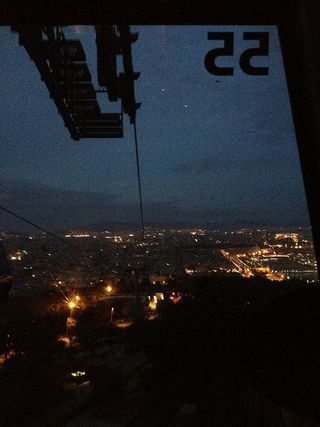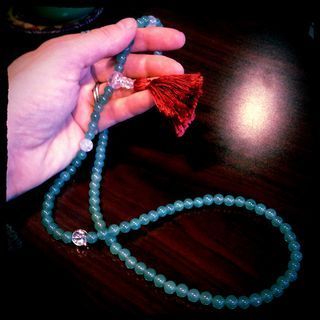Rachel Barenblat's Blog, page 141
November 20, 2014
Coffee talk
We hesitate at the unlit stairwell
but two men sitting in the dark
nod and point us upwards.
Four flights up we reach
al-Sendebad: open on all sides,
Abraham’s tent in concrete.
We sit on plastic chairs
overlooking streets, square, park,
noisy with people in the cool of night.
We are the only visitors here.
Everyone else is local, a regular.
They wear pants and caftans, sport
mustaches and checked kefiyyahs.
I am the only woman in sight.
Two men play backgammon; two
cards; everyone talks. One man
juggles pipe with cellphone,
old world with new.
Thumbing our Berlitz we eke out
requests for hot mint tea and a nargil.
The waiter gestures, raises a brow,
confirming we really do want
what tourist literature translates
as “hubble-bubble pipe.”
The tobacco, cut with molasses,
smells sweet as the honeysuckle
that blooms at twilight.
With their thick mustaches,
backgammon and smoke,
these men remind me of my father.
I imagine him here, nargil trailing
from his lips, scattering dice
on the table and moving stone pips
across the board. He doesn’t play
in person since Philip died,
just online games with strangers
now and then fast words
in the chat window, “What’s wrong,
U still there?” Some of his opponents
are Arabs, Saudis he says, maybe even
Jordanians. Looking out at Amman
at night, listening to the men laugh
and play, I wish my father were here.
Maybe the smoke and coffee
would add up to a common language.
First published in The Wisconsin Review, Vol. 38, No. 1, fall 2003.
Beth's drawings of mint tea and sheesha made me think back to my first trip to Amman, Jordan, in 2002. That, in turn, led me back to this poem. I wrote this in 2002 shortly after our return home.
2002 was before I had my first digital camera, so my photographs from this trip are all prints in an album -- the kind with sticky pages and clear plastic overlays. Twelve years later the plastic overlays are brittle and breaking, and some of the photos don't want to pull free from their pages. Although there were no photos from the nighttime coffee shop visit which sparked this poem, I scanned some of the best ones from the album. If you're interested, you can find them here.
November 19, 2014
Salve
You, standing in line
at the coffee shop
or shivering at the gas pump --
what phone call do you dread
in the back of your mind
from the moment you wake up?
I don't know what grief lurks
in your dark corners
or what kind word
would settle around you
like a knitted afghan
warming your cold places,
would salve
your abraded heart.
I've been thinking a lot lately about the invisible worries and sorrows we carry with us, whether intimate or geopolitical. This poem came out of those reflections.
Usually titles are hard for me, but once the last couplet came together I knew what the poem's title would be. I like the way it hints both at balm and (via Latin) at salvation.
November 18, 2014
There has to be another way
Today's news out of Jerusalem rends my heart.
The mere fact of being alive being means that each of us will experience suffering: sickness, pain, grief. These come with being human. Being human means we experience love and joy and connection, and it means we also experience sorrow and loss. Sometimes I struggle mightily against that truth, but deep down I recognize that it's part of the way the world works. Human lives contain enough pain just by virtue of being human lives. Why do we add to that pain with hatred and killing?
I woke this morning to news of killings in a Jerusalem synagogue. My social internet this morning is full of images of bloodsoaked prayerbooks, tallitot, and tefillin -- unspeakably horrifying for those of us who pray with these same garments, these beloved words. The images evoke the Jewish community's worst fears and most deeply-entrenched memories of trauma. We can't help imagining our own morning prayer shattered, our own loved ones attacked in these ways.
My social internet is also full of people responding to this tragedy in the ways that we always do,1 which heightens my grief with a sense that our conversations are futile. We're not getting at what really matters: when are human beings going to stop killing each other? What kind of spiritual and emotional evolutionary leap would it take, and how many more parents and children and spouses and siblings are going to have their lives shattered by trauma before we get there?
Slaughtering people at prayer is one of the most despicable acts I can think of. That's true whether the slaughter is committed by a Jew against Palestinians, or a Palestinian against Jews. And now I read that Netanyahu has vowed to "respond with a heavy hand," and that Hamas praises the attack (though Abbas has condemned it), and my heart cries out for God's sake, stop! Where can the spiral of violence and retribution take us but more violence and retribution? There has to be another way.
We need a larger framework of conflict transformation. We need to find a way to lift ourselves up, out of the positions we already hold and the things we've already tried. We need to seek to see the situation from a God's-eye view in order to create a path toward a different future. The Sfat Emet teaches that from where God sits (as it were) there are no binaries, no us/them, just goodness and oneness and love. As human beings we all have to find a way to see each other through God's eyes.
The worse things get, the harder it becomes to imagine anything other than continuing hatred and bloodshed. We have to imagine something other than continuing hatred and bloodshed. Please, God. Help us write a different ending to this story. And bring Your comfort and peace to those who mourn.
Mourner's Kaddish
I pray to You God,
that the power residing in Your Great Name
be increased and made sacred
in this world which God created freely
in order to preside in it,
and grow its freeing power
and bring about the messianic era.
May this happen during our lifetime
and during the lifetime of all of us
living now, the house of Israel.
May this happen soon, without delay
and by saying AMEN we express our agreement and hope, AMEN.
May that immense power residing in God's great name
flow freely into our world and worlds beyond.
May that Great Name, that sacred energy,
be shaped
and made effective
and be acknowledged
and be given the right honor
and be seen as beautiful
and uplifting
and bring jubilation.
Way beyond our input
of worshipful song and praise
which we express in this world
as our agreement and hope, AMEN.
May that endless peace
that heaven can release for us
bring about the good life
for us and for all Israel
as we express our agreement and hope, AMEN.
You, who harmonize it all
on the highest planes:
bring harmony and peace to us,
to all Israel and all sentient beings
as we express our agreement and hope, AMEN.
(translation by Rabbi Zalman Schachter-Shalomi of blessed memory.)
1. One friend posts to Facebook to remind other Jews that our Muslim friends condemn the attacks and we shouldn't let the acts of extremists poison our hearts. Another friend posts that this act of violence took place within a framework of systemic injustice. A third friend says, how could you even mention the occupation at a time like this, when our own people have been slaughtered? A fourth friend points to images of members of the Popular Front for the Liberation of Palestine celebrating the massacre as proof that no peace can be made with people like that. Each of my friends says exactly what I would expect them to say; it's as though we're reading from a script.↩
November 17, 2014
Looking for Chanukah gifts? Support independent publishing!
Chanukah begins in mid-December, and perhaps you are looking for Chanukah gifts for someone in your life who loves poetry. (Hey, I can hope, right?) I hope you'll consider clicking through to Phoenicia Publishing, the wonderful independent press in Montreal which published my first two collections, and buying their books as Chanukah gifts.
Of course I'm always happy for people to buy my work. So if you know someone who would enjoy a copy of 70 faces: Torah poems or Waiting to Unfold (poems of pregnancy and motherhood), by all means, please buy copies and give them away! (The publisher and I both earn a wee bit more if you buy directly from Phoenicia rather than via Amazon, using these links: 70 faces, Waiting to Unfold.)
But I'm not just here to try to entice you to buy more copies of my books. Phoenicia has also published a lot of other wonderful things -- recently How Many Roads?, a collection of beautiful photographs from the 60s and early 70s by Jonathan Sa'adah, and Night Willow by Luisa A. Igloria, both of which are really worth owning and would make terrific gifts.
I've recently received an official publication date for my next collection of poems -- it's definitely coming out in 2015 from Ben Yehuda Press, along with collections of poems by two other terrific writers! -- and while I can't yet encourage you to buy that new collection, if you're interested in books of general Jewish interest you will certainly find goodies on their website too.
Thanks for bearing with me during this commercial interlude! And thanks for supporting indie publishers -- I know how hard they work to bring beautiful work into the world, and I want their efforts and care to be rewarded.
November 16, 2014
Reaching wholeness: brief thoughts on Chayyei Sarah
Here's the d'var Torah I offered yesterday at my shul. (Cross-posted to my From the Rabbi blog.)
For me the most striking feature of this parsha -- which contains Sarah's death, Avraham's purchase of the Cave of Machpelah, Eliezer his servant going forth to find a wife for Isaac, Rebecca watering his camels at the well, and finally Avraham's death -- is that Isaac and Ishmael come together to bury their father.
How often it happens that a death brings a family together, trumping distance and even estrangement. When we gather together to mourn, we are united in the most defining characteristic of human life: every life ends.
Torah doesn't tell us how Isaac and Ishmael felt, reunited for this purpose. It doesn't tell us how the brothers greeted one another, or whether there was animosity between them; whether they blamed their parents for the tensions of their divided family, or whether they were able to let all of that go.
I imagine them embracing, old resentments discarded in the face of their shared grief. I imagine them grateful to be together, caring for their father's body lovingly as their descendants still do today. That imagining probably says more about me than about them; we know surprisingly little about their internal lives.
There's a Hasidic commentary, from the rabbi known as the Degel Machaneh Efraim, which translates the words "Sarah died" in a really interesting way. He says we should understand the word tamat, "she died," as actually meaning wholeness and completeness. (This is a bit of Hebrew wordplay which is hard to translate -- just roll with me on this.)
For the Degel, what happened to Sarah, in her hundred and twenty-seventh year, was that she achieved perfect wholeness and completeness. When she died, her life became complete, by definition, no matter what she had done or not done. She left the imperfections and the limits of her body and her health and her circumstance and entered into a state of perfect wholeness.
And at the end of the parsha, we read yamat Avraham - the same verb, "he died," or "he reached perfect wholeness and completeness." I like the Degel's interpretation. When a soul leaves this life, brokenness and alienation and small-mindedness all fall away. The soul gets "breathing room," as it were, for the natural expansiveness which connects it with God.
That doesn't mean that Isaac and Ishmael didn't grieve. For their sakes, I hope that they did. I hope they were able to mourn their parents. I hope they were able to embrace their loss as a sign of how fortunate they were to love and be loved, even by figures as flawed as our Biblical patriarchs and matriarchs seem to have been.
But I hope there was comfort for them in being with each other, and in knowing that Sarah and Avraham's journeys were complete.
I followed this d'var Torah with the poem "In the Same Key," which you can find in 70 faces: Torah poems (Phoenecia Publishing, 2011.)
November 14, 2014
Tempest in a teapot
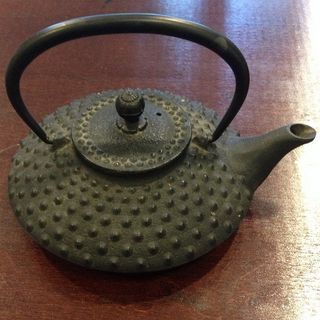 I was writing an email to a dear friend recently and acknowledged, somewhat ruefully, that my mind has been spinning in circles lately. By way of illustration, I typed out the several things at the top of my mind. When I saw it all written down, I started to laugh. It seemed comical all of a sudden, and repetitive, and impossibly mundane. Like a boring and familiar grocery list of the things which come up again and again.
I was writing an email to a dear friend recently and acknowledged, somewhat ruefully, that my mind has been spinning in circles lately. By way of illustration, I typed out the several things at the top of my mind. When I saw it all written down, I started to laugh. It seemed comical all of a sudden, and repetitive, and impossibly mundane. Like a boring and familiar grocery list of the things which come up again and again.
The friend wrote back and offered me a mental exercise: imagine a container, she said. Imagine every detail, where it's placed, what it looks like, everything about it. And then take all of these recurring worries and put them in the container and close the lid. You're not ignoring them; you're putting them away for safekeeping. You can think about them later. When she first did this, she told me, the container she pictured was a teapot.
I was immediately charmed by the mental image of stashing away one's worries in a teapot. Like graciously inviting a genie to return to its lamp. Not forever; just for now. Usually "a tempest in a teapot" means something minor which has been exaggerated out of all proportion. And who knows, my recurring worries may fit that bill. But I like the idea of being able to shrink my internal tempests and tuck them away somewhere safe. (Perhaps the teapot is bigger on the inside.)
I read recently that the goal of meditation isn't to "silence" the mind, but to attune oneself to its chatter. I know this to be true, and yet it's always good to be reminded. Thinking thoughts is the mind's job. Of course the mind is always abuzz. Thoughts, reminders, to-do lists, memories, regrets, anticipations, hopes, yesterdays, tomorrows. When I sit still and let myself notice what arises in me, then I can begin the work of relating to myself gently, with compassion, without judgement.
And sometimes, when my mind just keeps yammering about the same subset of things, I think I may try to open up the teapot and gently pour those things inside. I imagine myself saying, "Yes, work deadline, I see you there. Yes, upcoming travel, I see you there. Yes, concern for a loved one, I see you there. You have made your presence known and I acknowledge you. Now it's time for you to go into this teapot so that I can enjoy the now, instead of listening to your clamor about later."
If I were going to pour my tempest into a literal teapot, this would be a good one -- it is made of cast iron and seems pretty indestructible.
Four poems from 70 faces set to music
Several years ago, composer Michael Veloso set two of the poems from the manuscript which would become Waiting to Unfold to music. I had the extraordinary experience of being able to hear them in concert, performed by the Boston-based ensemble Cantilena, at a concert of music about mothers, on my first mother's day as a mother.
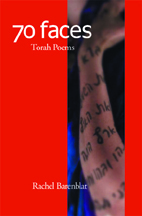 I'm delighted to say that another composer has found inspiration in my words. Michael Scherperel set four poems from 70 faces for piano, violin, and voice in a series called "שבעים / Shiv'eem" ("Seventy"). The series was recently performed by Michael and vocalist Susan Boardman at two recent concerts, one at Penn State and one at Studio 37 Recital Hall in Fishers, Indiana. (He tells me the songs were very well received!)
I'm delighted to say that another composer has found inspiration in my words. Michael Scherperel set four poems from 70 faces for piano, violin, and voice in a series called "שבעים / Shiv'eem" ("Seventy"). The series was recently performed by Michael and vocalist Susan Boardman at two recent concerts, one at Penn State and one at Studio 37 Recital Hall in Fishers, Indiana. (He tells me the songs were very well received!)
You can read about the composition, and if you are so inclined order the score, at his website. You can also click on the Soundcloud link there and listen to a live recording of one of those performances -- or you can listen to it at Soundcloud. (I'd embed the audio here but that doesn't seem to be possible, so if you want to hear the songs, you'll have to click through.)
This kind of creative collaboration is part of why I make my poems available online for free, and why I'm such a big supporter of Creative Commons and of remix projects like the Poetry Storehouse. I'm honored that Michael Scherperel liked my poems enough to set them to music, and hearing them performed is an amazing experience. Thank you, Michael and Susan!
November 12, 2014
Handwritten
This handwritten copy of one of my poems was shared at morning davenen at the Reconstructionist Rabbinic College yesterday:
(The image was sent to me by a friend and colleague who was there.)
I am so gratified and humbled that someone loved this poem enough to copy it out and share it!
There is something especially beautiful, I think, about a handwritten copy of a poem. Handwriting has personality. It's irreducible, irreplaceable; it can only come from the hand which wrote it. Seeing my poem written out in an unfamiliar hand is like hearing one of my poems recorded in someone else's voice.
And, of course, I'm glad that my love of all of these figures -- Avraham, Sarah, Isaac, Ishmael -- comes through for the person who chose to copy this poem.
You can find this poem in 70 faces, my collection of Torah poems published by Phoenicia Publishing in 2011. (Makes a great Chanukah gift for lovers of Torah and lovers of poetry alike!)
May peace and love come to all of the children of Avraham / Ibrahim, speedily and in our days.
November 11, 2014
Two years ago: Barcelona
Two years ago this week Ethan and I went to Spain, where I had never been before. He had been engaged to speak at a conference in Barcelona, and we took advantage of that fact to snatch a tiny little vacation. The conference put us up at a hotel we would almost certainly not have chosen -- the W, which is perched on a curl of land at the very edge of the sea. When we walked along the beach and looked back at our lodgings, the building evoked a billowing sail open to the wind.
When we are at leisure, we tend to spend our days walking. We walked miles every day, all over the city. We snapped photographs of building facades and architectural details and glimpses of the city life unfolding all around us. Every so often we stopped for a coffee or a glass of wine, and then we set off on foot again. One of the places we made sure to visit was the open-air market. I love breathing in the scents of whatever is local -- fresh fruits, or burlap bags of spices, or the briny harvest from the sea.
Seeing how the people shop, and what they buy, and whether they haggle, is one way to get a sense for a place. I have loved Makola Market in Accra, Machane Yehuda in Jerusalem, the Great Market Hall in Budapest...and now the Mercat de Sant Josep de la Boqueria in La Rambla. After strolling its aisles and admiring everything from navajas to hanging Spanish hams, we bought good bread, sharp sheep's-milk cheese, fresh strawberries, and a cup of pomegranate seeds for an impromptu picnic.
One of my favorite food discoveries in Barcelona was pimientos de padrón. (They're not unlike shishito peppers.) They were placed before us on our first night there, and I ordered them everywhere we went thereafter. They were prepared incredibly simply: just roasted or fried in olive oil, and sprinkled with flakes of good sea salt. Most of them are piquant but not spicy -- but some of them are quite hot, and they look exactly like the milder ones, so eating them is a kind of culinary roulette.
As resplendent as the market is, in all of its colors and shapes, the work of Antoni Gaudí is more so. We visited a private home (the Palau Güell) designed and created by Gaudí, and marveled at underground vaults with spiralling stairs and rooftop whimsies in the shape of giant tile-mosaic fruits. On the morning that Ethan was speaking at the conference, I visited Gaudí's inconceivably gorgeous Sagrada Familia, still under construction. (I wrote about that at the time.)
On the last day of our trip, we went up into the hills to visit a museum dedicated to the work of Joan Miró, and then took a cable car to the high vantage of Montjuic. From there we could see the whole city spread out beneath us -- from the downtown, to our distant hotel on its spit of land, to the working port where shipping containers were stacked like giant Legos. By the time we took the cable car back down, night was falling. We descended into the glow of the city's lights.
I'm taking advantage of the #throwbackthursday / #tbt meme -- which usually involves posting old photos on Thursdays -- as an opportunity to write short snippets of remembrance.
Related: Unexpected gifts, about meeting my parents for breakfast at Heathrow as I was on my way to Barcelona.
November 10, 2014
Beads
There is something satisfying about the tangibility of the beads. I like the way they feel in my hands, the smoothness of them beneath my fingers. I like the feel of one clicking against the next.
They sit in a coil on my desk. Every so often I pick them up, holding them in my left hand. I take one bead between thumb and forefinger, and in my mind I chant Shema Yisrael, Adonai Eloheinu, Adonai Echad, Adonai Echad.
The melody is one which I learned for a Sufi-style zhikr practice many years ago. In that practice, we chanted the words of the Shema over and over, leaning left (shema Yisrael) and right (Adonai Eloheinu) and then forward (Adonai Echad) and forward again (Adonai Echad.) I'm not moving my body now, any more than I'm singing aloud, but I am remembering the movements along with the melody and the words.
And then I click the bead down the string and take the next one under my thumb and mentally chant the lines again.
And again.
I do this while I'm on the phone, sometimes. Or while I'm reading. When the beads are under my thumb, the prayer just keeps repeating itself, a subroutine running automatically in the back of my mind while my forebrain is focusing on my reading or my conversation.
Listen up, you Godwrestlers! The Infinite is our God; the Infinite is One.
No matter what I'm doing, no matter what's happening in the world, everything is part of a deeper unity. God is One. And God is everywhere; as we read in Tikkunei Zohar, leit attar panui mineih -- there is no place devoid of the Presence. Everywhere, everyone, everything, is part of that unity. Ein od milvado: there is nothing else but God, in the end.
I can't walk around all day in mystical awareness of the Oneness of all things. In order to live in the world, I have to be an individual -- a single person, with a single mind and heart and soul. And I love being this person, in these relationships, doing this work in the world. But deep down, I'm not separate from you. Or from her, or him, or them. None of us is separate. We're all part of the One. We're droplets of water falling over the waterfall, and when we reach the bottom we rejoin the Oneness from which we came.
And with every bead I click along this string, I recite a line of prayer which reminds me of that.
Are mala beads an "authentically Jewish" practice? Nope. This is a practice borrowed from Buddhism. (Actually a lot of traditions make use of prayer beads, among them Hinduism, Buddhism, Islam, and Christianity. This particular string of beads was a gift from a dear friend who is Buddhist.) But this piece of borrowed spiritual technology adapts well to the Jewish ideal of praying constantly. As Rav Abraham Isaac Kook (of blessed memory) wrote, "Prayer comes into full bloom only as we become aware that the soul-breath / the neshamah is always praying."
Moving the beads between thumb and forefinger is a little bit like winding the fringes of my tallit around and between my fingers while praying. I remember winding the silken strings of my grandfather's tallit between my fingers when I was a kid. There's something satisfying about the tactile experience of drawing the fringes between the fingers. Having recently learned how to tie tzitzit, I am extra-conscious of the fact that the windings and knots represent the phrase Adonai Echad, "God is One." Fingering my tzitzit is a reminder of that Oneness.
And because the Shema is my current mantra, fingering these beads is a reminder of that Oneness, too. A way of infusing my workday with a little bit of contemplative practice.
Shema Yisrael, Adonai Eloheinu, Adonai Echad, Adonai Echad.
Click.
Rachel Barenblat's Blog
- Rachel Barenblat's profile
- 6 followers


